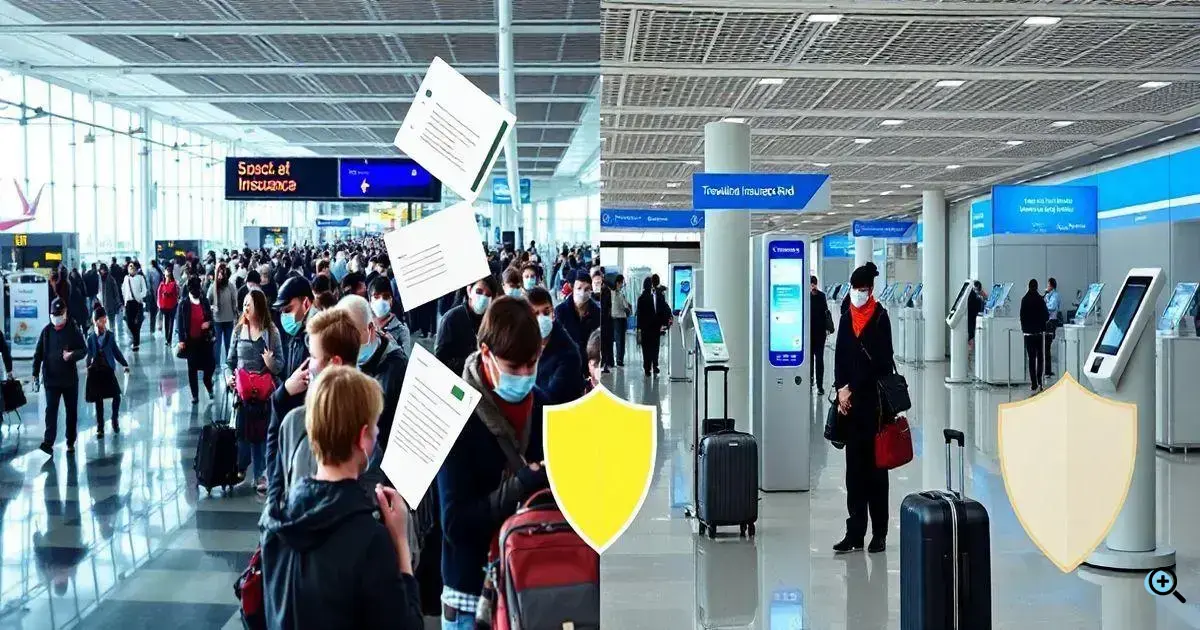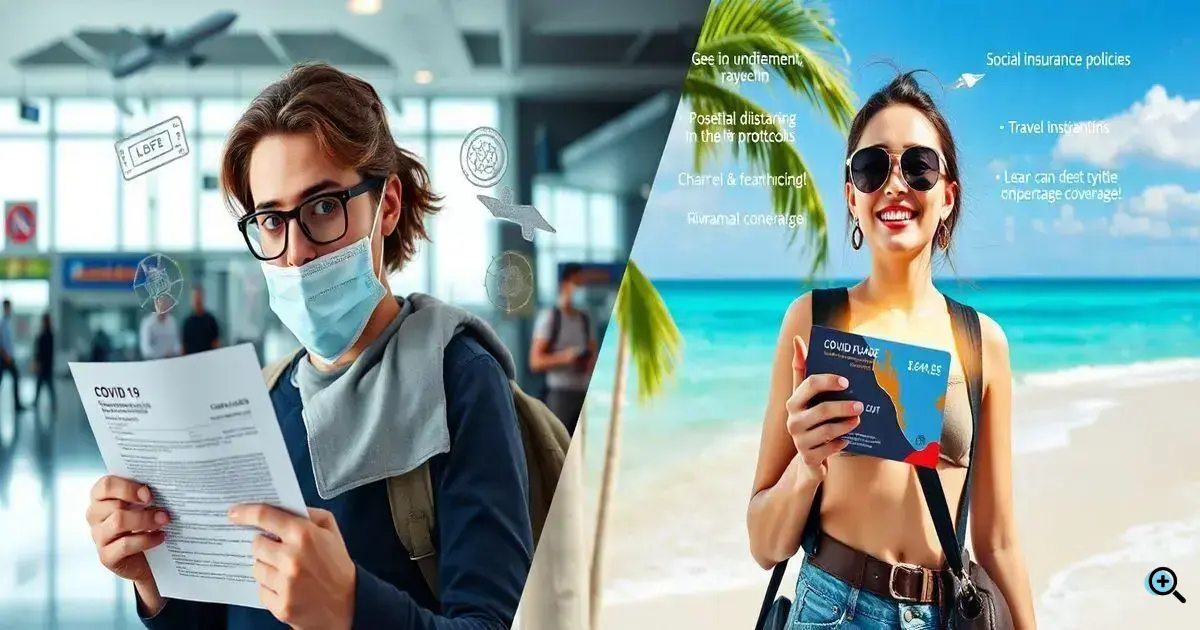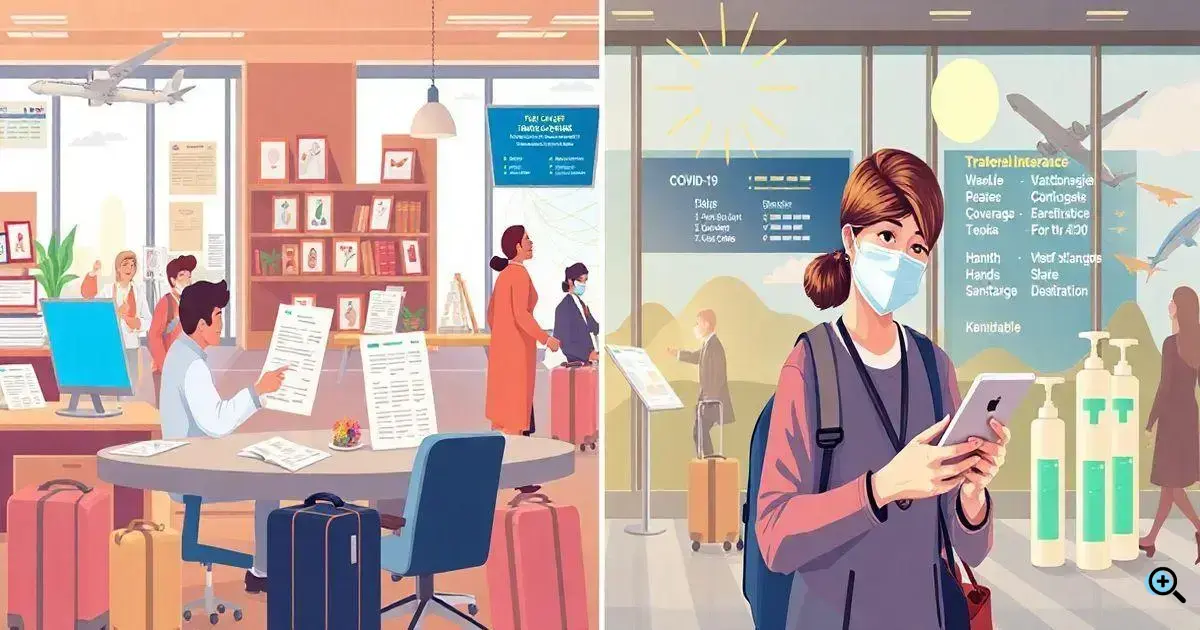Contents
- 1 The Impact of COVID-19 on the Travel Industry
- 2 Changes in Coverage Options
- 3 The Rise of Cancel for Any Reason Policies
- 4 Health and Safety Protocols in Travel Insurance
- 5 Navigating Claims Processes During a Pandemic
- 6 The Future of Travel Insurance Post-Pandemic
- 7 Frequently Asked Questions about Travel Insurance and COVID-19
- 7.1 How has COVID-19 changed travel insurance policies?
- 7.2 What is ‘Cancel for Any Reason’ insurance?
- 7.3 What health and safety protocols are included in travel insurance now?
- 7.4 How has the claims process changed during the pandemic?
- 7.5 What can we expect from travel insurance in the future?
- 7.6 How can travelers protect themselves with travel insurance?
The COVID-19 pandemic has ushered in unprecedented changes across various sectors, and travel insurance is no exception. As travel resumed post-lockdowns, insurers had to adapt to new realities and traveler concerns. This article delves into the key ways COVID-19 has reshaped travel insurance policies, providing essential insights for travelers navigating the new landscape of coverage and protections.
The Impact of COVID-19 on the Travel Industry
The COVID-19 pandemic has brought unprecedented disruptions to the travel industry, affecting airlines, hotels, and tourism-related businesses around the globe. Lockdowns, border closures, and health concerns led to a drastic decrease in travel demand, with international tourist arrivals plummeting by over 70% in 2020 compared to the previous year.
As travel restrictions began to lift in 2021, the industry faced new challenges, including changing health regulations and the need for enhanced safety measures. Travelers began to prioritize health and safety when choosing destinations and accommodations, leading to a shift in how travel companies operate.
Industry Response
In response, airlines introduced flexible booking policies, allowing travelers to change or cancel their flights without hefty fees. Hotels and travel operators implemented stringent cleaning protocols and contactless services to build consumer confidence. This transformation not only addressed immediate concerns but has also set new standards for the industry moving forward.
Moreover, the demand for domestic travel surged as international travel remained uncertain. Tourists began exploring local destinations, prompting a resurgence in domestic tourism. This shift has encouraged communities to invest in local attractions and promote eco-friendly travel options, reflecting a potential long-term shift in travel behaviors.
Ultimately, the pandemic has catalyzed a fundamental rethink in the industry, pushing stakeholders to innovate and adapt to a new landscape. The impact of COVID-19 will likely reshape the travel experience for years to come, influencing everything from pricing and policies to the types of experiences that travelers seek.
In conclusion, the COVID-19 pandemic has had a profound impact on the travel industry, forcing it to adapt quickly to a changing environment and consumer expectations. Understanding these changes is crucial for both travelers and industry professionals as the world navigates a path toward recovery.
Changes in Coverage Options

As the COVID-19 pandemic unfolded, travel insurance providers responded by revising their coverage options to meet the evolving needs of travelers. Traditionally, most travel insurance policies had limited or no coverage for pandemics, leaving many travelers without support when cancellations due to COVID-19 became widespread.
In response to the unprecedented situation, insurers began introducing new policy features that specifically address COVID-19-related issues. This included coverage for trip cancellations due to illness, quarantine requirements, or government restrictions. Such changes reflect a growing recognition of travelers’ concerns and the importance of comprehensive coverage during unpredictable times.
Additionally, many travel insurance policies now offer benefits for medical emergencies related to COVID-19. This means that if a traveler contracts the virus while on a trip, they may be eligible for coverage of medical expenses, including hospital stays, treatment, and related travel costs. These additions have become essential as travelers prioritize health and safety during their journeys.
Changes in Coverage Options
Insurers are also starting to include coverage for costs associated with travel disruptions, such as missed connections due to flight cancellations or delays prompted by COVID-19. This improvement helps to alleviate the stress of navigating the uncertainties of travel during a pandemic, ensuring that travelers feel more secure in their plans.
Moreover, the introduction of flexible cancellation options has gained traction. Many insurers now allow travelers to adjust their flights or accommodations without incurring hefty fees, a feature that has become increasingly sought after in today’s travel landscape. These options enable travelers to make changes based on their comfort levels regarding COVID-19 risks.
In summary, the changes in coverage options driven by the pandemic have made travel insurance more relevant and essential than ever. Travelers are now presented with more comprehensive policies that cater to their health and safety concerns, reflecting an ongoing adaptation to the new normal in travel.
The Rise of Cancel for Any Reason Policies
In light of the uncertainties brought about by the COVID-19 pandemic, many travelers have turned to ‘Cancel for Any Reason’ (CFAR) travel insurance policies. These policies provide unprecedented flexibility, allowing individuals to cancel their trips for any reason—including personal, health-related, or political motivations—without the typical restrictions of standard travel insurance.
CFAR policies have gained popularity as they empower travelers to make decisions about their trips based on real-time information and their comfort levels. For example, if a traveler feels uneasy about a destination due to rising COVID-19 cases, a CFAR policy enables them to cancel without losing the entirety of their investment, offering peace of mind during uncertain times.
While these policies often come with a higher premium, the ability to cancel for any reason has proven invaluable. Most CFAR policies allow cancellations as late as 48 hours before departure, which is a significant benefit compared to the more restrictive timelines associated with standard cancellations.
Consumer Awareness and Demand
The pandemic has also highlighted the need for more transparent and accommodating insurance coverage. Travelers are increasingly aware of their options, and as such, many insurance providers have expanded their CFAR offerings to meet rising demand. This trend indicates a shift in consumer priorities, emphasizing flexibility and security.
Moreover, CFAR policies not only cater to concerns related to COVID-19 but also to a range of other uncertainties—be it changing travel plans due to personal reasons or unforeseen events. As a result, these policies have struck a chord with consumers seeking control over their travel experiences in a world where unpredictability has become the norm.
In conclusion, the rise of ‘Cancel for Any Reason’ policies marks a significant shift in the travel insurance landscape. By offering unparalleled flexibility and peace of mind, these policies are reshaping how travelers approach their travel plans, making insurance a key component of any travel strategy in today’s uncertain climate.
Health and Safety Protocols in Travel Insurance

The COVID-19 pandemic has prompted a comprehensive reevaluation of health and safety protocols within the travel insurance industry. As travelers become increasingly concerned about their well-being while journeying, insurance providers recognize the necessity of integrating health-related protections into their policies.
Many travel insurance plans now include coverage specifically for pandemic-related situations. This encompasses medical coverage for COVID-19 diagnosis, treatment while traveling, and emergency medical evacuations for those who contract the virus while abroad. These enhancements reflect an industry-wide commitment to addressing the unique health risks associated with travel in a pandemic-stricken world.
In addition to medical coverage, insurers are implementing protocols that provide for travel cancellations or interruptions due to COVID-19. Policies are being revised to cover expenses incurred due to sudden quarantine mandates or travel restrictions resulting from a COVID-19 outbreak in the destination area. This adaptability reassures travelers that they will not face significant financial losses due to unexpected health-related travel disruptions.
Health and Safety Standards
Moreover, leading insurers are also requiring providers to adhere to enhanced health and safety standards. This includes a mandate for hotels, airlines, and tour operators to implement stringent cleaning protocols, social distancing measures, and contactless services. Insurance companies are increasingly partnering with trusted providers to ensure that travelers receive reliable, safe services during their journeys.
As travelers seek clear guidelines on health and safety measures, insurance companies have begun to provide detailed information about what is covered under their policies concerning COVID-19 and other health risks. This transparency is critical in fostering trust and helping consumers make informed decisions about their travel insurance options.
In conclusion, the integration of health and safety protocols in travel insurance marks a significant shift in how the industry addresses the concerns of modern travelers. By offering enhanced coverage and ensuring that health measures are in place, insurers are actively working to restore confidence in travel during these uncertain times.
The COVID-19 pandemic has significantly impacted not only travel itself but also the claims processes associated with travel insurance. With an unprecedented number of claims filed due to cancellations, medical emergencies, and travel disruptions, insurers have had to adapt quickly to manage the demands and provide timely support to policyholders.
Initially, many travelers found the claims process overwhelming, particularly as insurance companies adjusted their operations to align with remote work policies and increased claim volumes. Some insurers experienced delays in processing claims, leading to frustration among travelers who were eager to receive their reimbursements for non-refundable expenses.
In response, many travel insurance providers have implemented streamlined claims processes. This includes online submission options, where travelers can easily upload required documentation and track the status of their claims in real time. Such enhancements aim to improve customer experiences and alleviate anxiety during these uncertain times.
Transparency and Communication
During the pandemic, insurance companies have also been more transparent about their coverage terms and the specific documentation required for pandemic-related claims. Clear communication about what is covered, how to initiate a claim, and the expected timelines has become crucial for building trust between insurers and consumers.
Additionally, customer service representatives have been trained to address the unique concerns arising from COVID-19 claims. Insurers are focusing on providing personalized assistance to guide travelers through the claims process, ensuring that they understand their rights and the steps involved in securing their benefits.
In conclusion, navigating claims processes during a pandemic has brought challenges to both insurance providers and travelers. As the industry adapts to the new landscape, improvements in claims handling and customer service are helping to ease the burden on travelers, ensuring they receive the necessary support and compensation in times of need.
The Future of Travel Insurance Post-Pandemic

As the world gradually moves toward recovery from the COVID-19 pandemic, the landscape of travel insurance is poised for significant evolution. The unexpected challenges posed by the pandemic have compelled insurers to rethink their policies, operations, and customer engagement strategies to better serve the needs of modern travelers.
One of the most notable shifts is the increased emphasis on comprehensive coverage options. Travelers are now more aware of potential risks and are likely to seek policies that offer robust protections against a broader range of issues, including pandemics, natural disasters, and political unrest. Insurance providers will need to adapt by developing more inclusive and flexible policies that cater to these heightened expectations.
Technological Integration
Furthermore, as digital solutions become increasingly prevalent, the future of travel insurance will likely see enhanced technological integration. Insurers will continue to invest in user-friendly platforms that facilitate the purchasing process, claims management, and customer support. Automation and artificial intelligence could play vital roles in expediting claims processing and enhancing customer service experiences.
Moreover, the trend toward sustainability may also influence the future of travel insurance. As travelers become more conscious of their environmental impact, insurers may respond by offering policies that support eco-friendly travel practices or provide incentives for sustainable travel choices. This alignment with consumer values could enhance brand loyalty and attract a new demographic of environmentally-minded travelers.
Finally, as global travel resumes, the industry will need to maintain flexibility and transparency in its offerings. Travelers will continue to seek assurance that they can modify or cancel their plans without bearing excessive financial burdens. Insurers that prioritize clear communication regarding coverage terms and offer adaptable policies will be better positioned to thrive in the post-pandemic landscape.
In summary, the future of travel insurance post-pandemic promises to be characterized by greater inclusivity, technological advancements, sustainability initiatives, and enhanced customer focus. As travelers navigate the evolving landscape of travel, those insurers who adapt to these trends will be well-equipped to meet the shifting demands and expectations of their clients.
The COVID-19 pandemic has fundamentally transformed the travel insurance landscape, prompting significant changes in policies, coverage options, and industry practices.
As travelers faced unprecedented uncertainties, insurers have adapted by incorporating pandemic-related protections, enhancing health and safety protocols, and streamlining claims processes.
Key Takeaways
Travel insurance policies now offer comprehensive coverage for cancellations, medical emergencies, and disruptions related to COVID-19.
‘Cancel for Any Reason’ policies have gained popularity, providing travelers with greater flexibility and peace of mind.
Health and safety protocols have become an integral part of travel insurance, emphasizing both coverage for medical emergencies and support for safe travel practices.
The claims process has been refined to address the needs of travelers during the pandemic, focusing on transparency and customer service.
Looking forward, the future of travel insurance is expected to feature inclusive policies, technological advancements, and a commitment to sustainability.
As the travel industry continues to recover and evolve in the post-pandemic world, both travelers and insurers must embrace these changes.
By understanding the new landscape of travel insurance, travelers can make informed decisions that protect their investments and ensure safe, enjoyable journeys.
Frequently Asked Questions about Travel Insurance and COVID-19
How has COVID-19 changed travel insurance policies?
COVID-19 has led to significant changes in travel insurance policies, including the introduction of comprehensive coverage for pandemic-related cancellations and medical emergencies. Insurers have adapted to meet travelers’ concerns by enhancing policy terms and offering more flexibility.
What is ‘Cancel for Any Reason’ insurance?
‘Cancel for Any Reason’ (CFAR) insurance allows travelers to cancel their trip for any reason, often providing up to 75% reimbursement of non-refundable expenses. This policy has gained popularity as it offers greater flexibility and peace of mind in uncertain times.
What health and safety protocols are included in travel insurance now?
Many travel insurance providers now include specific coverage for COVID-19 medical treatment and related travel disruptions. Additionally, insurers are collaborating with service providers to ensure enhanced cleaning protocols and safety measures are in place.
How has the claims process changed during the pandemic?
The claims process has been streamlined for efficiency, allowing online submissions and real-time tracking. Insurers are focusing on transparency and personalized customer service to help travelers navigate their claims during these challenging times.
What can we expect from travel insurance in the future?
The future of travel insurance is expected to feature more inclusive policies that cover a wider range of risks, increased technological integration for better customer experiences, and sustainability initiatives that align with travelers’ values.
How can travelers protect themselves with travel insurance?
Travelers can protect themselves by choosing comprehensive travel insurance policies that cover cancellations, medical emergencies, and disruptions related to COVID-19. It’s essential to read the policy details carefully to understand coverage limitations and ensure peace of mind while traveling.







